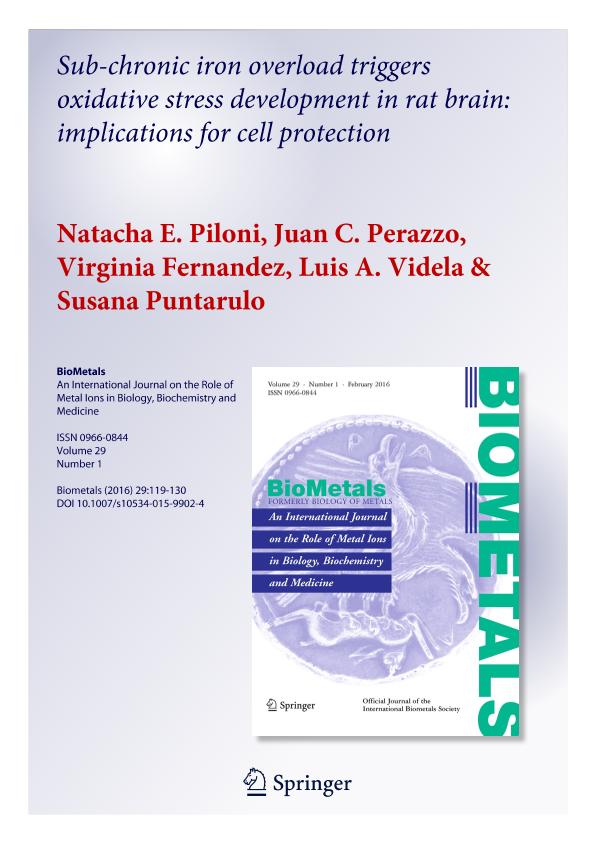Artículo
Sub-chronic iron overload triggers oxidative stress development in rat brain: Implications for cell protection
Piloni, Natacha Estefanía ; Perazzo, Juan C.; Fernandez, Virginia; Videla, Luis A.; Puntarulo, Susana Ángela
; Perazzo, Juan C.; Fernandez, Virginia; Videla, Luis A.; Puntarulo, Susana Ángela
 ; Perazzo, Juan C.; Fernandez, Virginia; Videla, Luis A.; Puntarulo, Susana Ángela
; Perazzo, Juan C.; Fernandez, Virginia; Videla, Luis A.; Puntarulo, Susana Ángela
Fecha de publicación:
02/2016
Editorial:
Springer
Revista:
Biometals
ISSN:
0966-0844
e-ISSN:
1572-8773
Idioma:
Inglés
Tipo de recurso:
Artículo publicado
Clasificación temática:
Resumen
This work was aimed to test the hypothesis that sub-chronic administration of iron-dextran (Fe-dextran) (six doses of 50 mg Fe-dextran/kg) to rats triggers a transient oxidative stress in brain and mechanisms of cellular antioxidant defence. After 2 h of administration of the 6th dose, a significant increase of total Fe, the labile Fe pool (LIP), the lipid radical (LR•)/α-tocopherol (α-T) content ratio were observed, as compared to values in control brain homogenates. The ascorbyl radical (A•)/ascorbate (AH-) content ratio and the oxidation rate of 2′,7′-dichlorodihidrofluorescein (DCFH-DA) were significantly higher in Fe-dextran treated rats, as compared to values in brain from control rats after 4 h treatment. An increase in both catalase (CAT) and superoxide dismutase (SOD) activity was observed at 8 and 1-2 h, respectively. No significant changes were detected in the nuclear factor-κB (NF-κB) levels in nuclear extracts from rat brains after 1-8 h of Fe-dextran administration. After 2 h of Fe administration Fe concentration in cortex, striatum and hippocampus was significantly increased as compared to the same areas from control animals. Both, CAT and SOD activities were significantly increased in cortex after Fe administration over control values, without changes in striatum and hippocampus. Taken as a whole, sub-chronic Fe administration enhances the steady state concentration of Fe in the brain LIP that favors the settlement of an initial oxidative stress condition, both at hydrophilic and lipophilic compartments, resulting in cellular protection evidenced by antioxidant enzyme upregulation.
Palabras clave:
Brain
,
Catalase
,
Iron
,
Nf-Κb
,
Oxidative Stress
,
Superoxide Dismutase
Archivos asociados
Licencia
Identificadores
Colecciones
Articulos(IBIMOL)
Articulos de INSTITUTO DE BIOQUIMICA Y MEDICINA MOLECULAR
Articulos de INSTITUTO DE BIOQUIMICA Y MEDICINA MOLECULAR
Citación
Piloni, Natacha Estefanía; Perazzo, Juan C.; Fernandez, Virginia; Videla, Luis A.; Puntarulo, Susana Ángela; Sub-chronic iron overload triggers oxidative stress development in rat brain: Implications for cell protection; Springer; Biometals; 29; 1; 2-2016; 119-130
Compartir
Altmétricas



